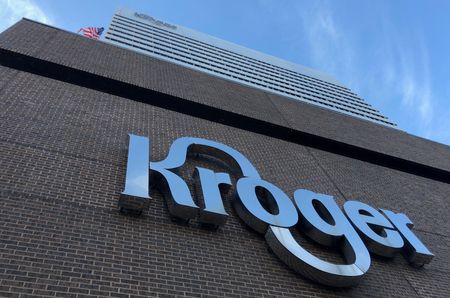By Deborah Mary Sophia
(Reuters) -Kroger on Thursday cut its annual sales forecast, pinched by moderating food and grocery prices at a time when demand has come under pressure from consumers keeping a tight lid on spending.
Grocery prices are now trending lower as fresh food items go into disinflation mode while packaged food items hit the ceiling on price hikes, limiting some of the sales benefits enjoyed by food retailers over the past year.
Consumers have also become increasingly thrifty and are picking cheaper alternatives, even in groceries.
“Although inflation is decelerating, customers are still adjusting to the impacts from eight consecutive quarters of broad and significant inflation,” CEO Rodney McMullen said on a post-earnings call.
To spur demand, Kroger has ramped up promotions. Its in-store displays with low-price everyday staples, for instance, have been drawing in more budget-conscious customers and boosting store visits.
While that has helped improve unit volumes, growth rates have not yet matched the inflation decline and “have not improved at the pace we would have expected”, CFO Gary Millerchip said.
Still, a tight rein on expenses and increased demand for higher-margin private-label items helped Kroger surpass market estimates for third-quarter profit. Its shares rose 2% in morning trade.
Kroger also lifted the low end of its annual per-share adjusted earnings range to between $4.50 and $4.60, higher than LSEG estimates of $4.53 at midpoint.
The company also said it had “certified substantial compliance” with the Federal Trade Commission’s request for additional information on its near-$25 billion deal for smaller rival Albertsons.
Kroger now expects fiscal 2023 identical sales, excluding fuel, to grow 0.6% to 1%, down from its prior forecast toward the low end of a 1% to 2% rise.
“It was a very straightforward report, very much in-line … Of course, you’d like to see a little bit better strength, but it totally makes sense (given the disinflation in the environment),” said Telsey Advisory Group analyst Joseph Feldman.
(Reporting by Deborah Sophia in Bengaluru; Editing by Devika Syamnath)

